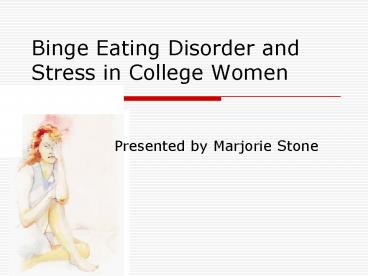Binge Eating Disorder and Stress in College Women - PowerPoint PPT Presentation
1 / 18
Title:
Binge Eating Disorder and Stress in College Women
Description:
How do stress and binge eating disorder relate? ... Characterized by repeated binge eating without the appropriate weight control ... – PowerPoint PPT presentation
Number of Views:61
Avg rating:3.0/5.0
Title: Binge Eating Disorder and Stress in College Women
1
Binge Eating Disorder and Stress in College Women
- Presented by Marjorie Stone
2
To Sum It Up For You
What is a binge eating disorder? Reasons that
people develop this disorder? What is stress? How
do stress and binge eating disorder relate? Why
would these two issues be prevalent in college
women?
3
You may want to know
- We are all women in college. Seems prevalent
enough for me! - We are all exposed to the media and social
pressures of looking skinny, which is really
way below healthy - There are over 36, 000 undergrad women on this
campusperhaps you could help one?
4
The 4-1-1 about Binge Eating Disorder
- DSM-IV Eating large quantities of food in a
discrete period of time accompanied by a sense of
lack of control over eating - Characterized by repeated binge eating without
the appropriate weight control methods (purging)
that distinguish the disorder from Bulimia
Nervosa - Body Image Dissatisfaction (BID) serious
psychosocial consequence of obesity associated
with binge eating - Closely related with Obesity
5
Antecedents of Binge Eating
- Family functioning or peer relationships
- Sexual abuse
- Body image disturbance
- Dietary restrictions and rules about food
- Over-concern with shape and weight
- Environmental cues (having binge type foods
readily available)
6
The 4-1-1 about Stress
- Stress is anything that throws the body off
balance - During stress, the body shuts down to prepare
for stressful event - Changes in body, such as decrease in appetite,
may excite someone with BED tendencies
7
BED Whats stress got to do with it?
- Body Image Disturbance ? Dieting and restraint ?
No physical changes (most often) ? STRESS! - College pressures Social pressures ? STRESS ?
stress-induced eating ? BED - Busy lifestyle ? missed meals or snack foods ?
Bingeing
8
Why College Women?
- Stressful time balancing school work social
life - Concerned with body image media, friends, peers,
and boys
9
THE RESEARCH METHOD
- Participants female undergrad BEG20 Control20
- Materials DSI, DCQ, Mood Measure, Daily Eating
Measure - Procedure self-monitoring forms for 21-day period
10
THE RESEARCH MATERIALS
- Daily Stress Inventory (DSI) review stress from
daily activities on a 1-7 scale (1 is not
stressful 7 caused panic) - Daily Coping Questionnaire (DCQ) describe most
bothersome part of the day given eight coping
strategies to choose how they deal with stress - Mood Measure anger-hostility,
depression-dejection, positive affect,
guilt/self-blame - Daily Eating Measure pick category that
describes food consumption for that day (ex.
Nibble vs. Binge)
11
THE RESEARCH RESULTSBetween group Comparisons
- Binge group high in depression, anger,
guilt/shame, but lower in positive affect - Binge group had more stressful events
- No difference in number of episodes of eating
12
THE RESEARCH RESULTSWithin Binge Group
Comparisons
- Binge days high in depression, anger,
guilt/shame, but low in positive affect - No differences in coping strategies used, BUT
that stress for a bothersome event was greater on
binge days - Binge days more episodes of eating
- Binge days not more stressful events
13
THE RESEARCH DISCUSSIONBinge vs Control
- Binge eaters experience twice the stressful
events the impact is greater - BEG mood ratings were more negative while
positive affect was low - BEG used more coping strategies, but when
avoidance strategy was removed (feel better by
smoking, etc) the CG BEG were equal - BEG CG had similar eating habits
- BEG is restricting types of food rather than the
number of times they eat
14
THE RESEARCH DISCUSSIONBinge days vs Nonbinge
days
- No significant differences in total number of
stressful events on binge days, BUT the impact
was more severe - Mood ratings were negative positive affect low
- Binge eaters use adaptive as well as maladaptive
coping strategies - Number of times binge eaters ate was similar, but
they ate smaller amounts during those times
15
THE RESEARCH CONCLUSION
- Stress and negative mood ? antecedents of binge
eating SURPRISE SURPRISE! - Coping responses daily eating not so
significant
16
Comments, Questions, Concerns?
- Self-report biggest concern is honest answers in
the binge eating group - This experiment doesnt seem to touch on new
ideas rather confirming existing ones - The devices used to measure daily stress, mood,
and coping were designed predominantly for this
study and have no prior validity - This is a college sample (very different
atmosphere)
17
References
- Sapolsky, Robert M. Why Zebras Dont Get Ulcers.
New York Henry Holt Co, 1994. - Grilo, Carlos M. and Robin M. Masheb. A
randomized controlled comparison of guided
self-help cognitive behavioral therapy and
behavioral weight loss for binge eating
disorder. Behavior Research 43 (2005) 1509-1525.
18
References
- Grilo, Carlos M. and Robin M. Masheb. Correlates
of Body Image Dissatisfaction in
Treatment-Seeking Men and Women with Binge Eating
Disorder. Int J Eat Discord 38 (2005) 162-166. - Wolff, Gretchen E. and Ross D. Crosby, et al.
Differences in daily stress, mood, coping, and
eating behavior in binge eating and nonbinge
eating in college women. Addictive Behaviors 25
(2000) 205-216































